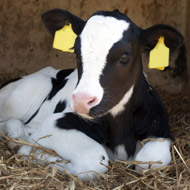IP outbreaks 'show difficulty in reaching diagnosis'

'These cases illustrate the unpredictability of IP outbreaks in cattle, and confirm the necessity for comprehensive veterinary investigation.'
Recent outbreaks of bovine interstitial pneumonia (IP) highlight the difficulties in achieving a diagnosis and the need for thorough veterinary investigation, experts say.
APHA and others reported the most recent cases, which occurred mainly in calves, in the latest Veterinary Record letters (Vol 179 No 23).
Several inciting causes of IP have been identified but in some outbreaks the specific cause cannot be pinned down, meaning there is potential for further disease to occur.
In the three most recent outbreaks, APHA reports the affected animals displayed varying degrees of dyspnoea, with the most severe cases showing open-mouthed breathing. There was a very poor response to antibiotic and anti-inflammatory treatment across all outbreaks. IP was suspected on gross post-mortem examination and confirmed by histopathology.
Prior to the outbreaks, cattle had shown no signs of disease and there had been no change in their diets. In one of the three cases, cattle were fed a mixed diet that included - when available - sweet potatoes, which have previously been associated with IP.
In another case, animals were fed freshly purchased calf-rearing nuts, which were not initially considered to be triggers. However, upon further investigation and discussions with the farmer, it became apparent that there was considerable mould contamination on the outside of the bales. Just before the outbreak, all of this straw had been eaten from the round feeder, and calves accessed mouldy remnants in the floor. Authors writing in Vet Record believe this to be 'the most likely plausible explanation'.
Another of the outbreaks was 'even more perplexing', they add. The animals had not moved pasture and baled silage was the only supplementary feed. But as the quality of baled silage is inconsistent, 'it is not unreasonable to consider that the cattle could have had access to mouldy areas'.
The authors concluded: 'These cases illustrate the unpredictability of IP outbreaks in cattle, and confirm the necessity for comprehensive veterinary investigation.
'This requires collaboration between the practitioner and veterinary pathologist. Gross postmortem examination and histopathology are essential, in addition to a thorough evaluation of the feeding history, to establish definitive diagnoses and enable provision of appropriate preventative advice to farmers.'



 FIVP has shared a survey, inviting those working in independent practice to share their views on the CMA's proposed remedies.
FIVP has shared a survey, inviting those working in independent practice to share their views on the CMA's proposed remedies.